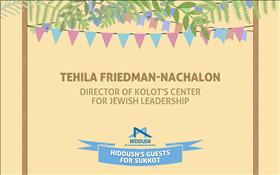Director of KOLOT's Center for Jewish Leadership
Sukkot 2016: Tehila Friedman-Nachalon
Tehila Friedman-Nachalon writes, "The battles that Hiddush sees as battles for 'religious freedom,' I perceive as battles over the substance and understanding of the 'Jewish' in 'Jewish and democratic.'"
21/10/2016 15:45
Tags: Sukkot 2016

Sukkot 2016: Tehila Friedman-Nachalon
Over the past decade, I have participated in and led quite a few battles and campaigns related to the place of Judaism in Israel, to the relationship between religion and state, and to the design of public space to allow for an expression of diverse identities. The battle against the exclusion of women from the public sphere; campaigning for an "Israeli Shabbat" according to the principles of the Gavison-Medan Covenant ("yes to culture and no to commerce"); the battle over the use of ritual baths; support and action for the alternative (outside the Rabbinate's auspices) kashrut certification called "Hashgacha Pratit;" and others.
And still, when I was invited by Hiddush to write about "religious freedom and equality," I felt uneasy. Not because of the host, but rather because of the language.
This language, the language of freedom, the liberal language; as a jurist I understand this language well, but as an Orthodox person and social activist, it is not my language. For me, the choice to use this language prevents partnership across the wider community, including traditional and religious, which could identify themselves with many of these issues and battles, if only they were presented in a different language.
The demand for freedom, any freedom, is a demand that puts the individual in the center. His needs, his dreams, and essentially his rights and ability to choose. Society, in this context, is seen as a "night watchman," as a platform, whose role is to ensure that individuals can prosper, to ensure their welfare, and essentially not to interfere. From this perspective, the state does not have its own identity, or perhaps its identity is so thin as to hardly exist at all.
The battle over Israel's ability to be a home for every Jew, which according to my faith requires the recognition of the primary identity of Jews in the Diaspora, which is non-Orthodox. The battle over the ability of people with different interpretations of Judaism to express their faiths in Israel.
The State of Israel is the fulfillment of a dream of millions of Jews for thousands of years. It is an expression of the will and self-sacrifice of the many who sought and seek to establish a national home for the Jewish people, as well as a democratic, civil home. That's putting it differently.
The battles that Hiddush sees as battles for "religious freedom," I perceive as battles over the substance and understanding of the "Jewish" in "Jewish and democratic." The battle over Israel's ability to be a home for every Jew, which according to my faith requires the recognition of the primary identity of Jews in the Diaspora, which is non-Orthodox. The battle over the ability of people with different interpretations of Judaism to express their faiths in Israel. The battle over the prohibition against and damage done by taking one group's interpretation of Torah and forcing it by law upon all the people. Not because the interpretation isn't justified or isn't true to the original, but because of separation among Jews, hatred and the alienation that this causes.
We, or at least I, fight over the design of our society and fight over the shaping of Judaism.
I am a religious and Orthodox woman, and it seems to me that there are many who share my faith and support the battles I have described. "Freedom of religion and equality" is not what motivates such Jews. Concern for the integrity and future of the Jewish people and the State of Israel does.
Another language is needed.